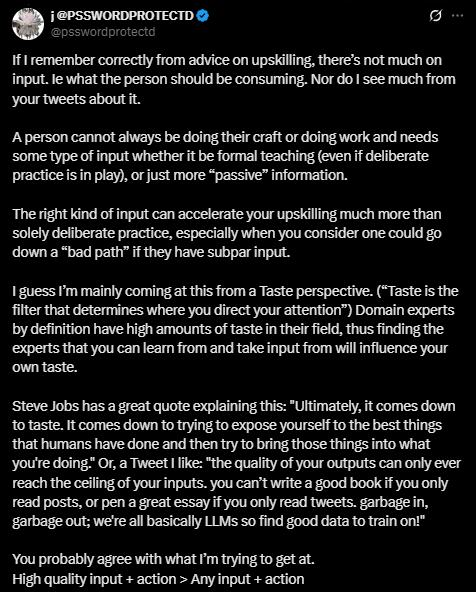Q&A: Thoughts on Input
Want to get notified about new posts? Join the mailing list and follow on X/Twitter.
Question
 x.com/psswordprotectd/status/1969189847236506029
x.com/psswordprotectd/status/1969189847236506029 Answer
- "finding the experts that you can learn from and take input from will influence your own taste"
"We're all basically LLMs so find good data to train on"
"High quality input + action > Any input + action"
Really interesting – yeah, I agree, and it’s something I haven’t thought about a ton. It’s true that I tend to focus more on stage 2 in Bloom’s talent dev process, climbing the tree of foundational skills where it’s pretty clear what expertise entails: Can you solve these equations / prove these theorems / write a query that gets you X / write an algorithm that quickly does X / etc.
But it’s true that once you get super high up the skill tree, the branches get thinner and thinner until you move into a kind of dispersed “ether” where you’re operating at the edge of what’s known and a large part of the challenge becomes figuring out what inputs to learn from. Like, in Bloom’s stage 3, who is the coach/mentor who is going to help you develop your unique taste/playing style and push the boundaries of the field. Or, more generally, once you get to the end of the standard foundational skill tree, what inputs are you going to use to train your output.
I actually talked to someone recently who seemed to be facing that challenge – he has a BS, a MS, and in-progress MD/PhD from three of the world’s most elite universities, and I assume he’s technically skilled, but he seemed a little lost/confused in terms of next steps. How do you choose a direction, how do you find a coach/team where the magic will happen. Seemed almost like a well-trained musician who could play a bunch of instruments but hadn’t really figured out their musical genre/style and hadn’t found the complementary band members that fill in the missing pieces of some puzzle.
That said, I tend to focus my writing on stage 2, climbing the skill tree, because in my experience that seems to be where most people get stuck in developing expertise. I continually see people failing in their endeavors due to missing skills that could be developed efficiently by climbing a known skill tree.
They think they are in stage 3 and just need to find that one magical moment, the magical mentor, the magical team, the magical set of inputs that will suddenly click traction into place on a magical outcome. But the problem is that they are barely into stage 2, they are at that dangerous point where they’re skilled enough to impress most people they know but they are really not that skilled in a professional capacity, and they cannot seem to find the magical moment/mentor/team/set of inputs that click traction into place on a magical outcome. And they think it’s because they’re not lucky enough, when really it’s because they’re not skilled enough. (Of course, there are people in the opposite failure mode who do get insanely skilled but don’t explore and put themself out there and find those magical inputs. But that failure mode is much less common in my experience.)
Anyway, I have thought about adding more about Bloom’s stage 3 in Advice on Upskilling, but have ultimately opted to keep it focused on stage 2 because stage 3 opens up a whole new can of worms, it would really need to be a whole book on its own, and I would need to spin up on more of the research and case studies. Right now my thoughts on stage 3 are mainly based on my own journey, what I’ve read in Bloom’s Developing Talent in Young People and a couple related sources, and what I’ve seen in a handful of people around me, which is a much smaller sample compared to all the cases and angles by which I’ve seen/experienced stage 2 play out.
This was interesting to think about just now and put some words down; reading and responding to your comment here definitely felt like a valuable input for myself. Thanks for sharing your thoughts!
Want to get notified about new posts? Join the mailing list and follow on X/Twitter.